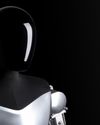
“It doesn’t call sick,” says Amir Siddiqi, whose family installed the AI voice at its Arby’s franchise this year in Ontario, California. “It doesn’t get corona. And the reliability of it is great.”
The pandemic didn’t just threaten Americans’ health when it slammed the U.S. in 2020 — it may also have posed a long-term threat to many of their jobs. Faced with worker shortages and higher labor costs, companies are starting to automate service sector jobs that economists once considered safe, assuming that machines couldn’t easily provide the human contact they believed customers would demand.
Past experience suggests that such automation waves eventually create more jobs than they destroy, but that they also disproportionately wipe out less-skilled jobs that many low-income workers depend on. Resulting growing pains for the U.S. economy could be severe.
If not for the pandemic, Siddiqi probably wouldn’t have bothered investing in new technology that could alienate existing employees and some customers. But it’s gone smoothly, he says: “Basically, there’s less people needed but those folks are now working in the kitchen and other areas.”
Ideally, automation can redeploy workers into better and more interesting work, so long as they can get the appropriate technical training, says Johannes Moenius, an economist at the University of Redlands. But although that’s happening now, it’s not moving quickly enough, he says.
This story is from the 01, January 2022 edition of Techlife News.
Start your 7-day Magzter GOLD free trial to access thousands of curated premium stories, and 9,000+ magazines and newspapers.
Already a subscriber ? Sign In
This story is from the 01, January 2022 edition of Techlife News.
Start your 7-day Magzter GOLD free trial to access thousands of curated premium stories, and 9,000+ magazines and newspapers.
Already a subscriber? Sign In

iPad mini - AI-READY DESIGN: THE A17 CHIP POWERHOUSE IN A COMPACT SIZE
Technology continues to shrink in size yet grow in capability, and the new iPad mini is no exception. The robust tool was designed to meet the demands of both personal and professional users.

16 Pro - AI-ORIENTED IMPROVEMENTS ON THE NEW IPHONE FLAGSHIP
At this year’s September Event, Glowtime, Apple unveiled new Apple Watches, AirPods, and iPhones.

iPhone 16 - THE STANDARD MODEL HAS NEVER BEEN THIS CLOSE TO PRO PERFORMANCE
The iPhone 16 and iPhone 16 Plus usher in a new era of tech powered by cutting-edge Apple Intelligence.

iPad Pro M4 - LOGIC PRO & FINAL CUT PRO: THE NEW HEIGHTS OF MOBILE COMPUTING
Apple wowed professionals with its all-new iPad Pro and iPad Air at its Let Loose event in May, but it is the accessories and software that will make the next generation of tablets stand out from the crowd and empower users to be more creative and productive than ever before.

Next Gen - iOS 18: PERSONALIZATION & INTELLIGENCE ACROSS MULTIPLE FEATURES & APPS
At this year’s WWDC, Apple introduced iOS 18, a significant update set to redefine the user experience on iPhone.

Robotics - AI TECHNOLOGY NOW TURNING SCI-FI INTO INDUSTRIAL REVOLUTION
The lines between science fiction and reality continue to blur, and new AI innovations bring the Machine Era closer to reality.

AirPods 4 - THE FAST EVOLUTION OF THE POPULAR WIRELESS EARPHONES
AirPods have transformed how we experience audio. With the introduction of the fourth generation, Apple is pushing the boundaries of innovation further, delivering immersive sound and connectivity.

Robot War - NEXT-GEN HUMANOID: OPTIMUS TESLA BOT VS ATLAS BOSTON DYNAMICS
Once a thing of science fiction, humanoid robots are now a reality, unlocking a new chapter in the world of technology and bringing to the fore a fascinating contest between two titans of the industry: Tesla, with its Optimus Tesla Bot, and Boston Dynamics, the creators of Atlas. It's a clash that could shape the future of robotics and how we live and work forever.

2024 THE DAWN OF THE APPLE INTELLIGENCE PRODUCTIVITY
2024 has been a groundbreaking year for Apple, with the tech giant continuing to deliver premium products catering to diverse users.

AUSTRALIA PLANS TO TAX DIGITAL PLATFORMS THAT DON'T PAY FOR NEWS
The Australian government said it will tax large digital platforms and search engines unless they agree to share revenue with Australian news media organizations.